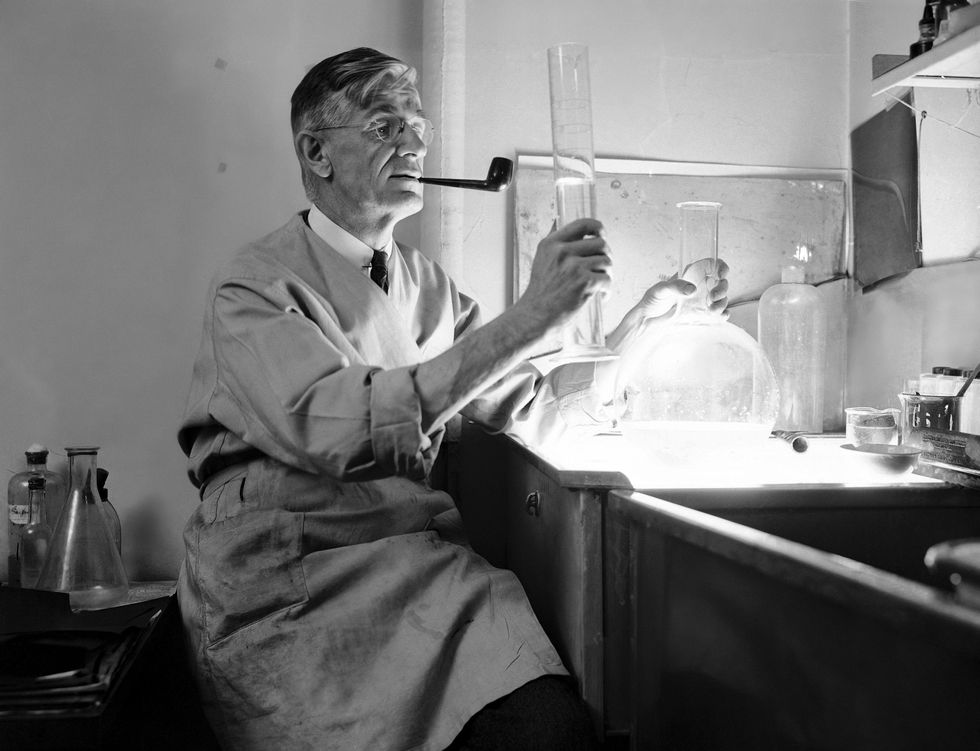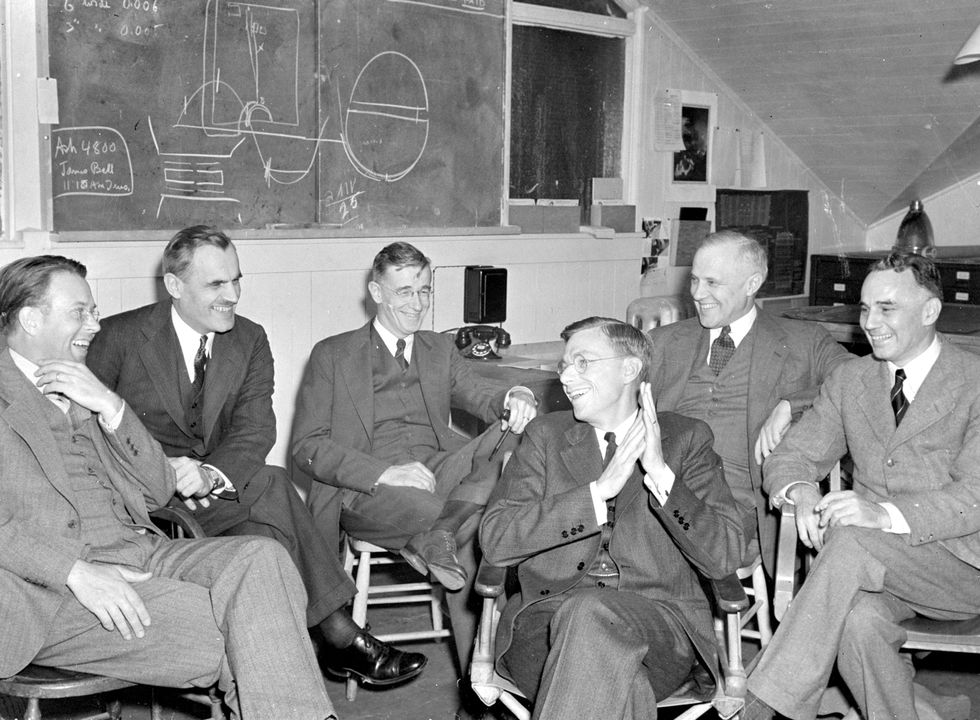

Vannevar Bush was the first trained electrical engineer to publicly proclaim in influential circles that EE’s are one engine of innovation and the driving in digital technology. As the early the 1930s, he viewed the entrepreneur and the engineer as twin forces for progress and technological advancement.
Born in 1890 in Massachusetts, he came to prominence as the nation’s top designer of computers while at MIT In the 1930s. During World War II, as personal science and engineering adviser to President Roosevelt, he led all research by civilians for the military and organized the Manhattan Project. After the war, he distinguished himself as a prime advocate for government funding of science and as a leading visionary the coming revolution in information technology. His “As We May Think” article, for the July 1945 issue of The Atlantic magazine, envisioned a desktop computer and a “web” of “associative trails” that no less than the founders of Google cite as the inspiration for today’s information science and the Internet.
Bush was a fount of wisdom, particularly when it came to defining the engineer's role in the industrial research and development enterprise. During the course of compiling Bush's seminal works for my new book The Essential Writings of Vannevar Bush, just published by Columbia University Press (2022), I pulled out some of particular interest to Spectrum readers:
Engineers and Good Writing
Writing is essential to the success of an electrical engineer, Bush wrote in 1922, in his first textbook, "The Principles of Electrical Engineering" (co-authored with a colleague, William H. Timbie). The success of any engineer’s plan, Bush insisted, often depends on good writing:
“Once the plan has been decided upon, he must convince his superiors that the plan should be carried out. This convincing requires that the engineer write brief clear English, which adequately and concisely conveys the meaning in a convincing way. Good proposals have been turned down because the engineers who drafted them could not present them in convincing form.”
Engineers Are Pioneers
The physical world is limited but the world of ideas without boundaries; and there are seemingly no limits especially in technology and science. To highlight this point, in Bush’s “Science the Endless Frontier” report to President Truman in July 1945, Bush wrote:
“The pioneer spirit is still vigorous within this nation. Science offers a largely unexplored hinterland for the pioneer who has the tools for his task.”
As We May Think

Bush didn’t foresee the technical means by which vast amount of information could be stored electronically but he correctly predicted in 1945 that radical miniaturization of information was on the horizon. Writing in his most famous essay, “As We May Think,” published in The Atlantic magazine in 1945, he envisioned that:
“A library of a million volumes could be compressed into one end of a desk.”
Grappling With Good and Evil
Bush promoted a cold-eyed realism about the uncertain outcomes of discovery and invention. He tried to balance optimism and pessimism about human activities in turbulent times. To scientists and engineers, he advised:
“We are embarked upon a great adventure, and it is our privilege to further it. Even though at times the box that is opened be Pandora’s, even though there are both good and evil in what we learn it is our duty and our calling to extend [humanity’s] grasp of the universe… By this process, of beginning to understand, we have made such progress as we have. Though the path be thorny, this is still the way in which we should proceed if we would finally emerge from darkness into the light.”
Envy the Duck
A master of metaphors, Bush searched for everyday analogies to explain technical products and processes. One of his favorites, from an essay, he penned in 1932 about the design and engineering of fabrics and clothing, was the duck:
“I have always envied the duck. He can dive under water and come up dry. Yet his coat is pervious to air as it should be for his good health, and it fits beautifully. The duck looks comfortable in his waterproof garments on a hot day, but the only raincoat I ever bought was hot, or it wasn’t waterproof, and it leaked at the neck when the rain drove horizontally. The Mongolians made a pervious felt that shed rain well, and Caesar thought well enough of it to adopt it. The duck can turn his head in any direction, and yet his covering on his neck lies marvelously smooth and sleek. Columbus found the Indians of Central America using feather garments; but even with their example, we still do not emulate the duck, nor do we look natty or comfortable in the rain.”
Research Is the Key

Before there was a “knowledge economy,” and before innovation became nearly synonymous with mastering new knowledge, Bush wrote, in 1932, about the perilous future facing individuals and institutions that failed to rely on research to enhance their survival:
“The key to accomplishment is research. It need not be complex, in order to be useful, but it certainly should be intelligent. In our modern tempo that industry is in danger which is in a static state. [Research] is a necessity [if only as] a defense against encroachment from without.”
Versatility as Virtue
While he spent many years as a professor of electrical engineering at MIT, Bush sought to imbue fellow professors with a goal of being practical, versatile and deep. Praising English-born engineer and inventor Elihu Thomson in 1933, Bush said:
“You have showed us that a man may be truly a professor and at the same time very practical. And one more thing I wish to emphasize. You have shown us that a scientist or an engineer may be, even in this complex world, versatile and yet not superficial.”
Disruption Leads to New Jobs

To the question of how we best consider the costs of technological advance, of what he viewed as “progress,” Bush told a Congressional committee in 1939:
“Progress, sir, always pays for itself by at least temporary disturbance. If we have a static world … that is lovely in one way, but if we are going to go ahead technically or in any other way then we must expect at least local disruption and temporary disruption, which means unemployment. There is no question, however, that the whole trend of invention, the whole trend of the introduction into industry of new devices and new ways of doing old things has been to greatly increase employment in the long run ….”
Peace Through Strength
The decision to work on weapons technology, or not, was highly personal to Bush and a decision not easy to unpack. Bush opposed rigid opposition to working on military problems on the grounds that peace can sometimes best be preserved through strength, writing in 1935:
“Perhaps the worker on antiaircraft is more effectively a worker for peace than his brother who condemns him. I do not make the assertion, I pose the question.”
In 1940, as fascist Germany overran France and threatened England with invasion, and as the U.S. government began to consider military aid to Europe’s democracies, Bush answered his own question with the statement, “For war or peace we must leave no stones unturned in research.”
Revere the Inventor
Throughout his long career as a builder of large research organizations, Bush retained his belief in the lone inventor and the daring technological entrepreneur. Speaking to an audience of electrical engineers in early 1944, he said:
“There must remain in the U.S. the opportunity for an Edison, the opportunity for any youth with initiative, resourcefulness, practicality and vision, to create his own name and, by his own efforts, new things that will tend to make this country vigorous and strong and safe.”
On Push-button Warfare

As the organizer of the Manhattan Project and among the experts who advised President Truman on dropping atomic bombs on Japan, Bush became an important voice after the war in trying to calm an American public anxious about nuclear war. In doing so, he sometimes erred in his predictions, as when he dismissed, in an 1947 article in the New York Times, the widespread fears that nuclear weapons would someday be launched by pushing a button (which eventually became possible):
“Push-button warfare be damned. This talk has done a lot of harm. … Certainly there would be innovations … but it would not be push-button warfare in any sense. Some of this ‘Buck Rogers’ thinking is a lot of hooey.”
Engineers Are Heroes
While scientists seemed to grab the glory in the popular press, Bush always sought to remind others that engineers are the true heroes. As he told a Congressional committee on research in 1963:
“Much of what we call scientific research is really engineering research or even straight engineering. Putting a communications satellite into orbit, and working, is an engineering job, and incidentally a magnificent one.”
Compiled by G. Pascal Zachary. The source of Bush's quotations is The Essential Writings of Vannevar Bush, edited by Zachary and published by Columbia University Press (2022). Quote #11 comes from NYT, Jan 9, 1947, “Push-Button Ideas of War Hit by Bush.”
Reference: https://ift.tt/tkCbNTw
No comments:
Post a Comment